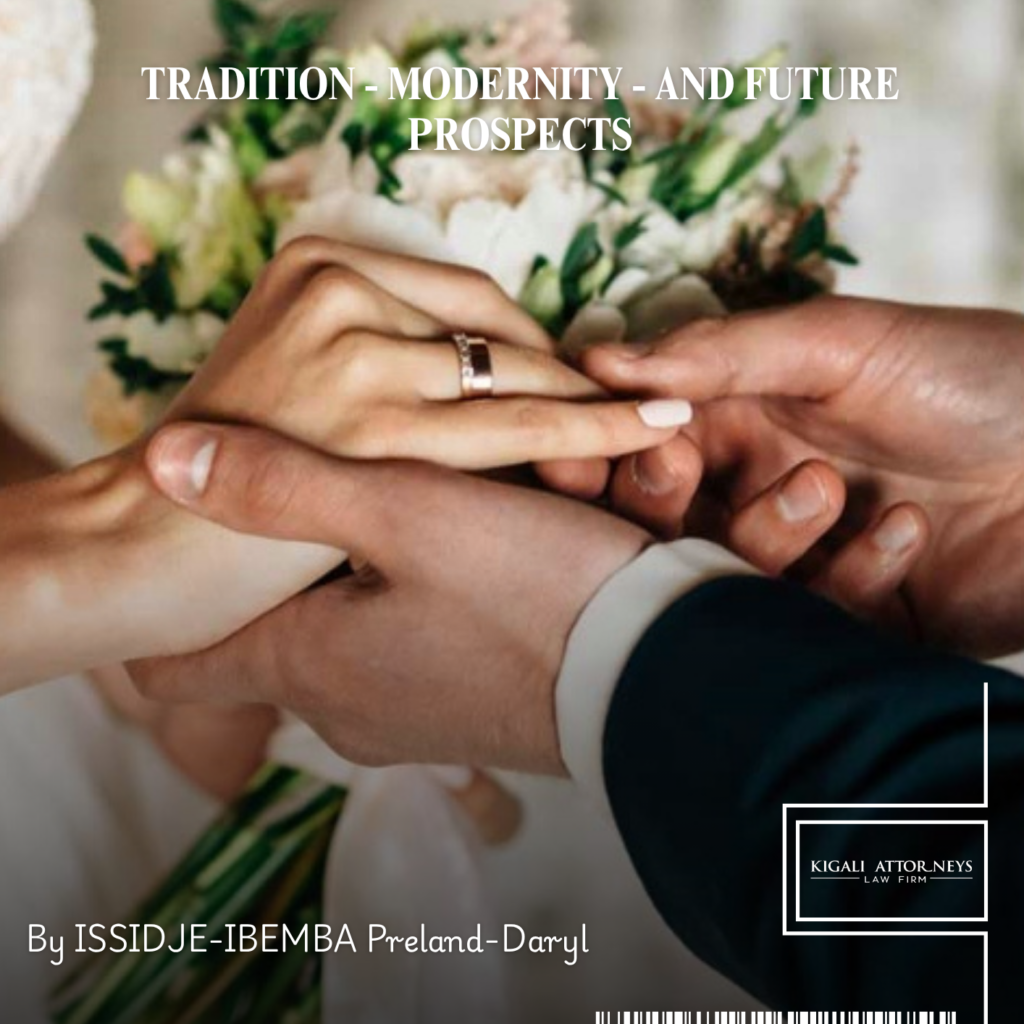INTRODUCTION
Marriage is a fundamental institution in Rwandan society, reflecting both centuries-old traditions and contemporary legal developments. Straddling deeply rooted customary practices and the demands of a modern rule-of-law state, Rwanda has successfully adapted its legal framework to govern this union while upholding fundamental rights. This article explores the various dimensions of marriage under Rwandan law: its traditional roots, recent legislative reforms, and the future outlook in a rapidly changing world.
I. THE LEGAL FRAMEWORK OF MARRIAGE IN RWANDA
1. Sources of Matrimonial Law
Marriage law in Rwanda is grounded in several key legal texts:
- The Constitution of the Republic of Rwanda (2023), particularly Articles 17 to 19, which relate to human rights and family;
- International conventions ratified by Rwanda, such as the Convention on the Rights of the Child (1989) and the Convention on the Elimination of All Forms of Discrimination Against Women (1979);
- Law No. 71/2024 of 26 June 2024 governing persons and the family, which forms the cornerstone of modern matrimonial law;
- Rwandan customs, recognized insofar as they do not contravene constitutional norms and fundamental rights.
2. A Major Reform: Law No. 71/2024
The recent Law on Persons and the Family profoundly modernizes Rwandan matrimonial law. It formally establishes civil marriage as the principal legal form of union while recognizing customary marriages, provided they comply with national law and are duly registered.
3. Marriage According to Rwandan Tradition
a) Customary Practices
Traditional marriage remains prominent in Rwandan culture. It typically includes several symbolic stages, such as:
- Ubukwe, the dowry negotiation between families, marking the start of the process;
- The presentation ceremony, a key moment where the families formally express their intentions;
- The payment of the dowry, in goods or money, symbolizing the alliance between two families.
Although culturally rich, the legal validity of these practices now depends on official registration and adherence to fundamental legal principles.
b) Legal Recognition of Customary Marriage
According to Article 196 of the Law on Persons and the Family, customary marriages are legally recognized when celebrated in accordance with established customs and registered by the competent authorities. They must ensure free consent and equality between spouses.
4. Civil Marriage: A Pillar of Modern Law
a) Procedure for Celebration
The law outlines several key steps for the validity of a civil marriage:
- The publication of marriage banns (Article 203);
- Verification of legal capacity (minimum age of 21, or parental authorization for minors, Article 197);
- Celebration by a competent authority (Articles 195 and 196).
b) Validity Requirements
A marriage must meet strict conditions: free and informed consent, absence of coercion or procedural defects, and prohibition of same-sex marriage (Article 17 of the Constitution and Article 195 of the Family Law).
5. Contemporary Issues
a) Protection of Women and Children
Rwandan legislation, particularly Law No. 58/2008 on the Prevention and Punishment of Gender-Based Violence, reinforces the rights of women and children within marriage. It guarantees equality between spouses and punishes domestic violence.
b) Same-Sex Marriage: An Emerging Debate
Rwandan law still prohibits same-sex marriage. While this aligns with traditional values, the issue remains the subject of growing debate as international norms evolve.
II. FUTURE PROSPECTS AND CHALLENGES
1. Toward Broader Recognition of Customary Marriages
Rwanda’s legal framework is increasingly integrating customary practices, provided they comply with fundamental rights. Mandatory registration ensures legal security while respecting cultural identities.
2. Equality Between Spouses and Protection of Rights
Future reforms could further promote substantive equality between spouses, particularly regarding divorce, child custody, property division, and inheritance. A gender-sensitive approach is expected to play a growing role.
3. Persistent Challenges
Despite progress, several challenges remain:
- Early and forced marriages, still common in some rural areas;
- Lack of legal awareness, which prevents citizens from understanding their rights and obligations;
- Occasional conflicts between customary and modern law, creating challenges for legal harmonization.
4. What Changes Lie Ahead?
Likely developments include:
- Recognition of new forms of unions, such as civil partnerships;
- Increased public awareness campaigns on marriage-related rights;
- Greater integration of gender equality principles into all legislative provisions, in line with international conventions.
Conclusion
Rwandan marriage law illustrates a dynamic balance between tradition and modernity. Recent reforms have built a robust legal framework that safeguards fundamental rights while celebrating the country’s rich cultural heritage. Nevertheless, challenges remain gender equality, effective recognition of customary practices, and prevention of early marriages. Rwanda thus stands at a crossroads, navigating between its cultural legacy and a commitment to a more inclusive society one where every union is grounded in equality, dignity, and mutual respect.


